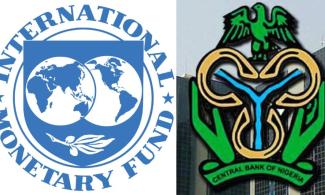
The IMF also highlighted that freshly appointed authorities under President Bola Tinubu had launched a number of reforms aimed at improving Nigerians' lives.
The International Monetary Fund (IMF) has backed the Central Bank of Nigeria for lifting limitations on 43 products previously barred from acquiring foreign money at the official window.
The IMF also highlighted that freshly appointed authorities under President Bola Tinubu had launched a number of reforms aimed at improving Nigerians' lives.
It was emphasised, however, that the reforms may take some time to produce the desired results.
In addition, World Bank President Ajay Banga complimented the resourcefulness of Nigerian entrepreneurs in a speech he delivered at the ongoing World Bank and IMF meetings, stating that he understands their desire to contribute to the advancement of society.
Abebe Aemro Selassie, Director of the IMF's African Department, revealed the IMF's approval of Nigeria's decision to remove forex restrictions on the 43 items during a media briefing on the Regional Economic Outlook for Sub-Saharan Africa in Marrakech, Morocco, at the ongoing IMF/World Bank Annual Meetings.
Selassie also emphasised the importance of improving tax changes in order to increase income production, generate more fiscal space, and lessen the burden of servicing and acquiring loans.
On the trade restrictions, he was quoted by AriseNews as saying: “The view of the IMF is that Nigeria and many other economies are so sophisticated and complex, that I don’t think that these kinds of restrictions work.
“The best way to manage a modern economy is to have fiscal policy lever and monetary policy lever to use to affect the kind of policy outcome you want, rather than saying I don’t like these goods and so I don’t want it to come in, etc, that tends to create an unhelpful distortion.
“Of course, there are tax policies you can also use if you really want to be against certain types of imports. In general, I think the direction the CBN has moved is a helpful one.”
Selassie also said Nigeria’s debt was sustainable, just as he said the country was not in talks with the IMF on debt restructuring.
Selassie continued: “I am not aware of any debt discussions that are going on, debt profiling or debt restructuring in Nigeria. In Nigeria, the most important cause of the pressures is the fact that the government does not generate enough tax revenue for all the services it needs to provide.
“Interest payment as a share of revenue is very high and does not leave much room to spend on other issues, that is the key issue that needs to be worked on.
“While there is not enough tax revenue, I think in the past reliance on oil when prices were high and secondly the subsidy regime which also implies and entails lots of government resources being directed where they should not be.
“These are all interlinked issues including causing some of the inflation that you have and the difficulty to tap into the international capital market. That is why the government has had to rely more on domestic financing which of course has crowded out the private sector and put constraints on monetary injections which has weakened the exchange rate.”